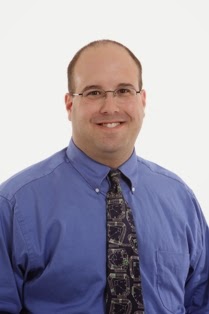I am Eric Martell and This is How I Work
Today, I’m interviewing Dr. Eric Martell for the This is How I Work series. Dr. Martell obtained a BS from North Central College in 1993 and a PhD from the University of Illinois at Chicago in 1999. His main area of research is theoretical particle physics. He has taught for two years at Grand Valley State University in Allendale, MI, one year at Vassar College in Poughkeepsie, NY, and two years at the University of Puget Sound in Tacoma, WA. He has been at Millikin University since 2004. On a personal level, he’s been married since 2004, and has three kids – a six year old and two year old twins (all boys).
Current Job: Associate Professor of Physics
Current Location: Millikin University
Current mobile device: iPhone 5S
Current computer: Lenovo Thinkpad (employer provided)
Can you briefly explain your current situation and research to us?
My school is a PUI with a standard 4/4 (12 contact hours/semester) teaching load. I teach courses from freshman-level intro to senior, plus research projects. My current research interests are in three main areas: 1) Physics of Theatre – applying physics concepts to mechanical design in theatre (my wife, who works at the University of Illinois at Urbana-Champaign, is my research partner), 2) Physics Education Research, and 3) Whatever my students are interested in.
What tools, apps and software are essential to your workflow?
In addition to the standard Office and internet apps, I also use National Instruments’ LabVIEW, Mathematica, LaTeX, GIMP, and Educreations on the iPad.
What does your workspace setup look like?
I have an office at work, a research lab which is used sometimes depending on the projects I’m doing, and I work from home, but not in any particular office.
This is roughly what my office looks like. We can pretend it’s still this clean.
I have a desk! pic.twitter.com/DiMxADkI8J
— drmagoo (@drmagoo) June 11, 2014
What is your best advice for productive academic work?
Find your balance. Some people can be in the office and do research 16 hours a day 6-7 days a week. Not everyone can. But if you burn yourself out, or make yourself miserable because you spend all your time at work, you won’t last. Your work is important, but it’s not the only important thing.
How do you keep an overview of projects and tasks?
I use Google Calendar, and I write out lots of lists.
Besides phone and computer, do you use other technological tools in work and daily life?
Daily life – tv, satellite radio; Work – classroom clickers, Vernier sensors, Arduinos, IOLabs
Which skill makes you stand out as an academic?
My ability to work across disciplines. I’ve done interdisciplinary research and teaching, collaborating with colleagues in theatre and in education, and worked effectively on university-wide committees, often in leadership positions. Being able to collaborate with people who have widely different philosophical and disciplinary experiences is important, especially at a smaller school.
What do you listen to when you work?
Music – typically rock or classic rock. I use Spotify a lot.
What are you currently reading?
I just finished a book called Storm in a Teacup, by Emmie Mears. I have to carve out time – there are weeks I don’t have much, and weeks I find a bunch.
Are you more of an introvert or extrovert? How does this influence your working habits?
It depends on the scenario. At work, I’m much more extroverted, because I feel that it’s my role as a faculty member to speak up for what’s important. I end up chairing a lot of committees and councils, which impacts my time to teach and do research.
What’s your sleep routine like?
I try to sleep about 11-6:30. Doesn’t always work.
What’s the best advice you ever received?
Listen more, talk less.

